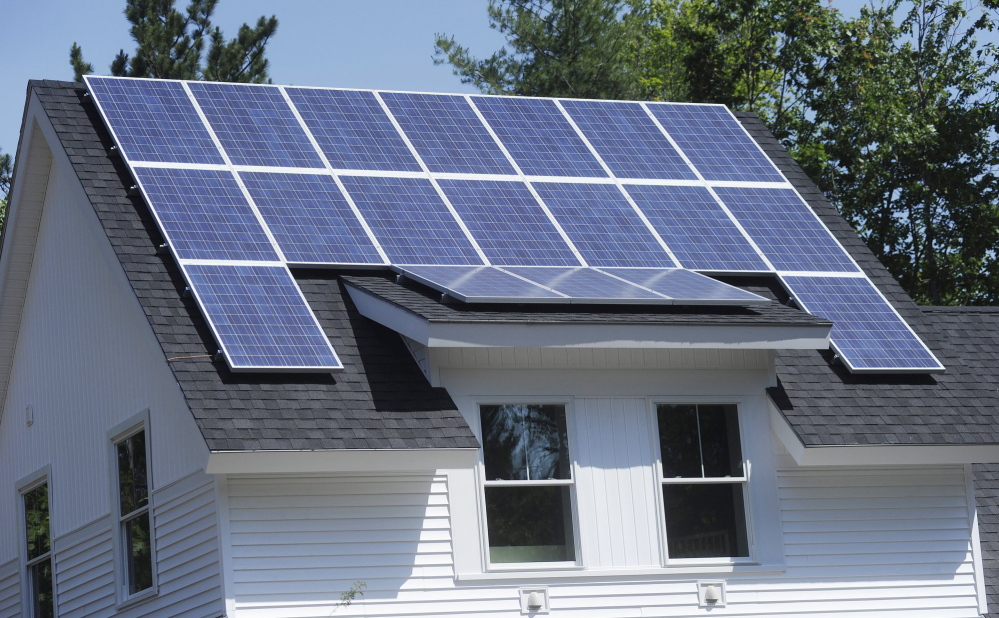Gov. Paul LePage has submitted three bills to the Legislature aimed at lowering energy costs, but clean-energy advocates said Tuesday that the measures would dismantle years of state policies that support renewable energy and efficiency programs.
At issue are three bills introduced in the last weeks of the legislative session. Taken together, they seek to advance the administration’s goals of lowering energy costs – notably electricity rates – for homes and businesses, according to Patrick Woodcock, the governor’s energy director.
But critics say the proposals are an assault on small businesses, notably companies that install solar panels, and will cut conservation and efficiency efforts by large employers.
With roughly a month before lawmakers are set to leave Augusta, it’s unclear whether there’s time to consider such sweeping changes, or if debate will be carried over until next year.
“The fact that they landed together so late in the session is catching people off guard,” said Dylan Voorhees, clean energy director for the Natural Resources Council of Maine.
Voorhees said LePage’s attempts to cut efficiency funding don’t square with his stated desires to lower energy costs.
“(One bill) would end Maine’s four-to-eight million-dollar initiative that saves the largest manufacturing and industrial energy users and all ratepayers money on their bills through energy efficiency contracts,” he said. “Energy efficiency is proven to be the most cost-effective way to reduce energy bills for businesses, and yet the governor seeks to defund and eliminate these programs.”
The tension between LePage and renewable energy advocates isn’t new. The governor has tangled repeatedly with wind and solar supporters, as well as with advocates of efficiency spending. The disputes reflect his often-stated belief that high energy costs are strangling Maine’s economic growth and that ratepayer charges that support renewable energy development and efficiency are part of the problem.
LePage has instead pushed for incentives that encourage natural gas pipeline expansion. On Wednesday, he’s set to testify in Washington, D.C., on draft bills aimed at speeding the federal regulatory review of hydroelectric projects and natural gas pipelines.
In Augusta, a proposed bill called An Act to Focus Energy Laws on Energy Cost would repeal Maine’s renewable portfolio standard, a longstanding law that requires electricity suppliers to make up a percentage of their output from renewable generation. Almost all the incentives now are going to biomass plants in Maine, including boilers at paper mills, and cost the average household a penny each month, according to the Maine Renewable Energy Association.
Another provision would repeal the state’s net metering law, in which utilities compensate homeowners with solar panels for their power generation, and replace it with a different pay system. A third part of the bill would have the effect of shifting the focus of long-term contracts at the Public Utilities Commission away from wind and other renewable generators.
Complementing that bill are two other pieces of legislation. One would cut money available for energy conservation programs, by returning a larger share of pollution auction revenue from the Regional Greenhouse Gas Initiative Trust Fund directly to businesses. The other would have utilities provide a credit “backstop” for agreements between natural gas shippers and large businesses seeking pipeline capacity.
The energy cost bill, however, was getting much of the attention on Tuesday, especially from solar installers. Their businesses rely now on the net metering law.
Vaughan Woodruff, owner of Insource Renewables in Pittsfield, said whatever happens with the bill, the fact that it’s being proposed by the governor can have a chilling effect on business. That’s because customers considering solar installations may wait to see whether the net metering law is changed.
“I’m quite disheartened, because it can put some uncertainty in the market,” Woodruff said.
Phil Coupe, co-founder of ReVision Energy, had this reaction: “We are rubbing our eyes in disbelief at the governor’s new energy bills, because they will take Maine’s energy policy back to the Stone Age.”
Coupe noted that renewable energy and clean-tech industries contribute more than $2.6 billion per year to Maine’s economy and create 12,000 jobs, according to an independent study funded by the Maine Technology Institute. This is happening, he said, despite the fact that Maine is the only state in New England without an incentive for renewable energy.
“It is mind-boggling that now the governor is trying to eliminate the remaining mechanisms – net energy billing, the renewable portfolio standard and the Regional Greenhouse Gas Initiative – that make clean energy financially viable in Maine,” he said.
Woodcock, the governor’s adviser, acknowledged that the energy-cost bill represented a wholesale change in state energy policy. But other concepts, he said, had been discussed previously by lawmakers. He expressed optimism that they would be taken up this legislative session.
Hearings on these bills likely will be held in the next week or so before the Legislature’s Energy, Utilities and Technology Committee.
Send questions/comments to the editors.




Success. Please wait for the page to reload. If the page does not reload within 5 seconds, please refresh the page.
Enter your email and password to access comments.
Hi, to comment on stories you must . This profile is in addition to your subscription and website login.
Already have a commenting profile? .
Invalid username/password.
Please check your email to confirm and complete your registration.
Only subscribers are eligible to post comments. Please subscribe or login first for digital access. Here’s why.
Use the form below to reset your password. When you've submitted your account email, we will send an email with a reset code.